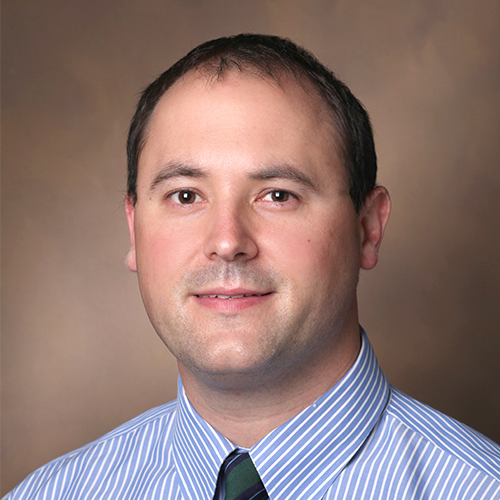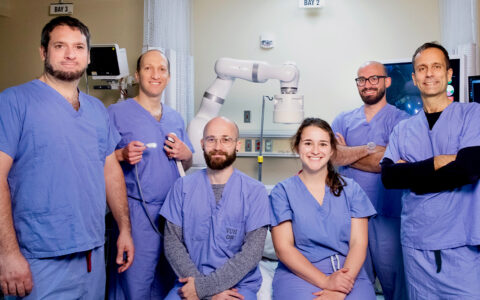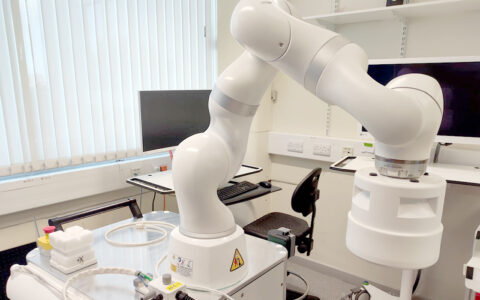Due to many factors, less than 1 percent of individuals who qualify for bariatric surgery undergo this procedure in the U.S. In the last decade, endoscopic techniques have emerged as a third option to treat obesity – in addition to pharmacological therapy and bariatric surgery – that offers some patients unique benefits.
The comprehensive weight loss center at Vanderbilt University Medical Center is now performing endoscopic sleeve gastrectomy (ESG), a minimally invasive incisionless procedure, as an additional tool to treat obesity.
“Medication therapies and traditional surgery are not available to some patients with a body mass index between 30 and 40,” said Matthew Spann, M.D., a bariatric surgeon in Vanderbilt’s surgical weight loss program. “Endoscopic sleeve gastrectomy fills the gap.”
Bariatric Surgeries vs. ESG
Of the four types of bariatric gastric surgery – adjustable gastric banding, vertical sleeve gastrectomy (VSG), Roux-en y gastric bypass (RYGB), and biliopancreatic diversion – VSG is currently the most commonly performed procedure at 61.4 percent.
“Vertical sleeve gastrectomy is often considered less invasive. However, because it surgically removes about 80 percent of the stomach it is not for everyone,” said Julianna Yang, M.D., an assistant professor in the division of Gastroenterology, Hepatology and Nutrition at Vanderbilt.
“Medication therapies and traditional surgery are not available to some people. Endoscopic sleeve gastrectomy fills the gap.”
In comparison, Spann says, ESG offers patients with fear of laparoscopic surgery a more powerful tool than diet and medication alone. It requires no incision and minimal downtime, though it occasionally requires an overnight hospital observation stay. It is ideal for patients with disease severity that does not respond to traditional medication and behavioral modification but is not severe enough for surgery.
One potential disadvantage is that ESG does not introduce the hormonal changes that contribute to glycemic control in traditional bariatric surgery.
“The top portion of the stomach produces about 90 percent of ghrelin, the hormone involved in the hunger cycle. Removing that portion of the stomach can contribute to dramatically reduced hunger with sleeve gastrectomy and gastric bypass,” Spann said. “With ESG, we don’t necessarily get the hormonal advantage.”
Evidence for Effectiveness
In the ESG procedure, Vanderbilt surgeons use endoscopy and the OverStitch™ Endoscopic Suturing System to place sutures in two rows along the greater curvature of the stomach, resulting in a gastric cavity that forms a tubular sleeve along the lesser curvature. The greater curvature is closed off from the gastroesophageal junction to the prepyloric antrum.
“ESG changes the shape of the stomach; it is folded into itself and is not able to expand to the same degree,” Yang explained, “and because it is done with sutures, it’s reversible.”
“There is a need for more prospective trials, especially comparing ESG plus diet and lifestyle vs. diet and lifestyle alone.”
For patients with BMI between 30 and 40, ESG has been shown to reduce gastric volume out to two years post-procedure, and increase time required for 50 percent gastric emptying of solids by 90 minutes. In the largest study to date, at six months post-procedure 1,000 patients had lost an average 64 percent of excess body weight and maintained this loss at 18 months. Said Yang, “ESG was beneficial in metabolic outcomes, and patients showed a significant decrease in diabetes, hypertension and hypertriglyceridemia.”
“There is a need for more prospective trials,” Yang noted, “especially comparing ESG plus diet and lifestyle versus diet and lifestyle alone.”
“Providing these procedures under the umbrella of our comprehensive center helps us deliver the best outcomes,” Spann added. “We can continue to monitor patients after the procedure to ensure we’re supporting their nutrition and augmenting with medication if needed.”






